八年级英语下学期的重点句型
- 格式:doc
- 大小:50.50 KB
- 文档页数:4
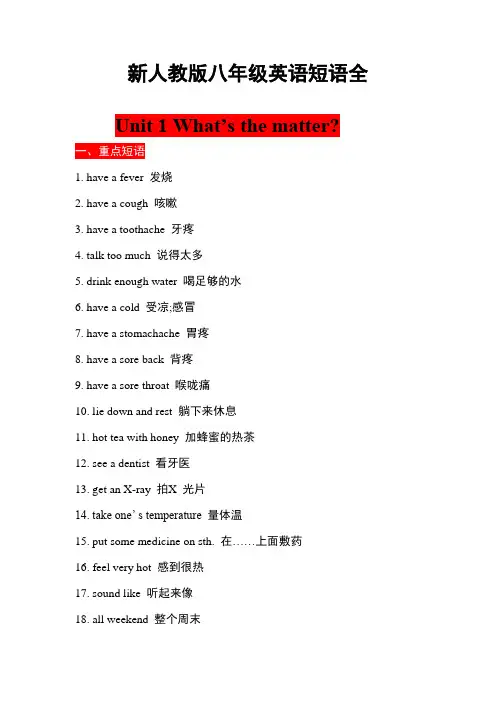
新人教版八年级英语短语全Unit 1 What’s the matter?1. have a fever 发烧2. have a cough 咳嗽3. have a toothache 牙疼4. talk too much 说得太多5. drink enough water 喝足够的水6. have a cold 受凉;感冒7. have a stomachache 胃疼8. have a sore back 背疼9. have a sore throat 喉咙痛10. lie down and rest 躺下来休息11. hot tea with honey 加蜂蜜的热茶12. see a dentist 看牙医13. get an X-ray 拍X 光片14. take one’ s temperature 量体温15. put some medicine on sth. 在……上面敷药16. feel very hot 感到很热17. sound like 听起来像18. all weekend 整个周末19. in the same way 以同样的方式20. go to a doctor 看医生21. go along 沿着……走22. on the side of the road 在马路边23. shout for help 大声呼救24. without thinking twice 没有多想25. get off 下车26. have a heart problem 有心脏病27. to one’ s surprise 使....... 惊讶的28. thanks to 多亏了;由于29. in time 及时30. save a life 挽救生命31. get into trouble 造成麻烦32. right away 立刻;马上33. because of 由于34. get out of 离开;从……出萍35. hurt oneself 受伤36. put a bandage on sth. 用绷带包扎37. fall down 摔倒38. feel sick 感到恶心39. have a nosebleed 流鼻血40. cut his knee 割伤他的膝盖41. put her head back 把她的头向后仰42. have problems breathing 呼吸困难43. mountain climbing 登山运动44. be used to doing sth. 习惯做某事45. run out (of) 用完;用尽46. so that 以便47. so. . . that 如此… …以至于…48. be in control of 掌管;管理49. in a difficult situation 在闲境中50. keep on doing sth. 继续或坚持做某事51. make a decision 做出决定52. take risks 冒险53. give up 放弃二、重点句型1. What’ s the matter?What’ s the matter with you?= What’s the trouble with you?= What’ s wrong with you?2. 你怎么了?What should she do?她该怎么办呢?Should I take my temperature?我应该量一下体温吗?主语+ should/shouldn’t + 动词原形. ..①You should lie down and rest.你应该躺下休息一会儿。
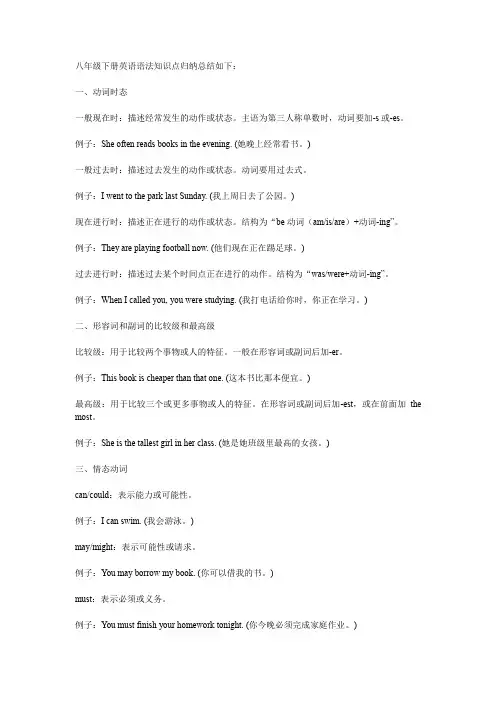
八年级下册英语语法知识点归纳总结如下:一、动词时态一般现在时:描述经常发生的动作或状态。
主语为第三人称单数时,动词要加-s或-es。
例子:She often reads books in the evening. (她晚上经常看书。
)一般过去时:描述过去发生的动作或状态。
动词要用过去式。
例子:I went to the park last Sunday. (我上周日去了公园。
)现在进行时:描述正在进行的动作或状态。
结构为“be动词(am/is/are)+动词-ing”。
例子:They are playing football now. (他们现在正在踢足球。
)过去进行时:描述过去某个时间点正在进行的动作。
结构为“was/were+动词-ing”。
例子:When I called you, you were studying. (我打电话给你时,你正在学习。
)二、形容词和副词的比较级和最高级比较级:用于比较两个事物或人的特征。
一般在形容词或副词后加-er。
例子:This book is cheaper than that one. (这本书比那本便宜。
)最高级:用于比较三个或更多事物或人的特征。
在形容词或副词后加-est,或在前面加the most。
例子:She is the tallest girl in her class. (她是她班级里最高的女孩。
)三、情态动词can/could:表示能力或可能性。
例子:I can swim. (我会游泳。
)may/might:表示可能性或请求。
例子:You may borrow my book. (你可以借我的书。
)must:表示必须或义务。
例子:You must finish your homework tonight. (你今晚必须完成家庭作业。
)四、被动语态被动语态用于描述事物的状态或描述被动发生的动作。
结构为“be动词(am/is/are/was/were)+动词的过去分词”。
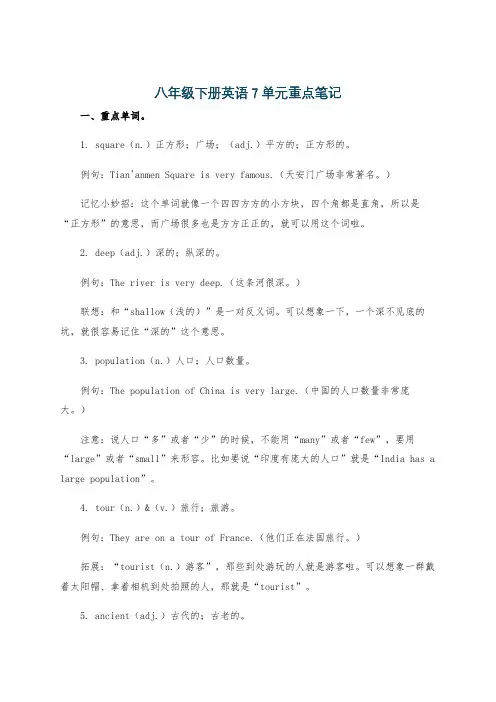
八年级下册英语7单元重点笔记一、重点单词。
1. square(n.)正方形;广场;(adj.)平方的;正方形的。
例句:Tian'anmen Square is very famous.(天安门广场非常著名。
)记忆小妙招:这个单词就像一个四四方方的小方块,四个角都是直角,所以是“正方形”的意思,而广场很多也是方方正正的,就可以用这个词啦。
2. deep(adj.)深的;纵深的。
例句:The river is very deep.(这条河很深。
)联想:和“shallow(浅的)”是一对反义词。
可以想象一下,一个深不见底的坑,就很容易记住“深的”这个意思。
3. population(n.)人口;人口数量。
例句:The population of China is very large.(中国的人口数量非常庞大。
)注意:说人口“多”或者“少”的时候,不能用“many”或者“few”,要用“large”或者“small”来形容。
比如要说“印度有庞大的人口”就是“India has a large population”。
4. tour(n.)&(v.)旅行;旅游。
例句:They are on a tour of France.(他们正在法国旅行。
)拓展:“tourist(n.)游客”,那些到处游玩的人就是游客啦。
可以想象一群戴着太阳帽、拿着相机到处拍照的人,那就是“tourist”。
5. ancient(adj.)古代的;古老的。
例句:The ancient buildings in Beijing are very beautiful.(北京的古建筑非常美丽。
)联想:“ancient”就像是从很久很久以前穿越过来的东西,像古老的城堡、古老的庙宇,都是“ancient”的。
二、重点短语。
1. as far as I know就我所知。
例句:As far as I know, he is a good student.(就我所知,他是一个好学生。
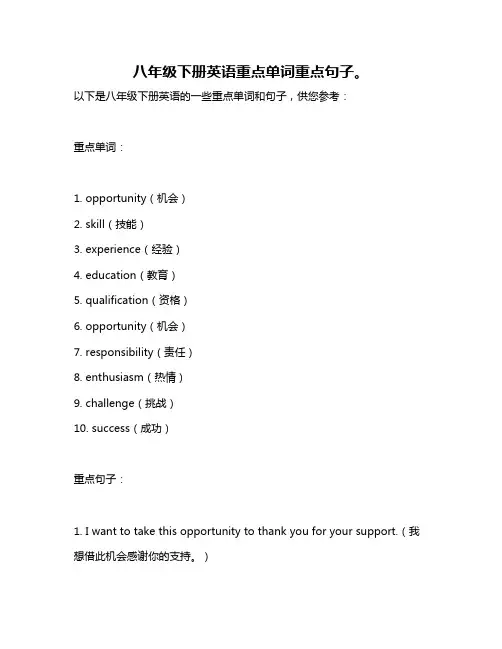
八年级下册英语重点单词重点句子。
以下是八年级下册英语的一些重点单词和句子,供您参考:重点单词:1. opportunity(机会)2. skill(技能)3. experience(经验)4. education(教育)5. qualification(资格)6. opportunity(机会)7. responsibility(责任)8. enthusiasm(热情)9. challenge(挑战)10. success(成功)重点句子:1. I want to take this opportunity to thank you for your support.(我想借此机会感谢你的支持。
)2. She has a lot of skills and experience in this field.(她在这个领域有很多技能和经验。
)3. They are looking for someone with good communication skills.(他们正在寻找具有良好的沟通能力的人。
)4. I think this job would be a great opportunity for me to learn and grow.(我认为这份工作对我来说是一个学习和成长的好机会。
)5. She has a lot of enthusiasm and is always ready to take on new challenges.(她充满热情,随时准备迎接新的挑战。
)6. He has a lot of responsibilities at work and is always reliable.(他在工作中有很多责任,并且总是可靠的。
)7. She is very qualified for this position and has the necessary skills and experience.(她非常符合这个职位的要求,并且拥有必要的技能和经验。
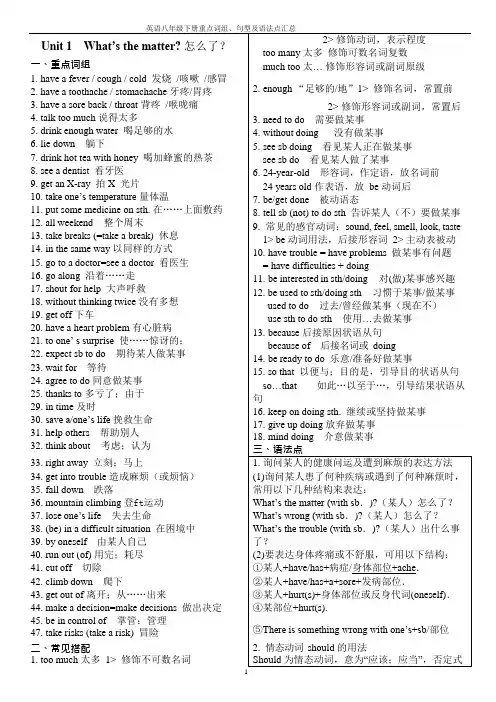
13.be back 回来14.be angry with sb 生某人的气15.throw down 扔下16.the minute=as soon as 一…就…e over 过来18.sit down 坐下19.take sb. for a walk 带某人去散步20.all the time 频繁;反复21.all day / evening 整日/夜22.shout back 大声回应23.walk away 走开24.in surprise 惊讶地25.share the housework 分担家务26.hang out 闲逛27.do chores 做杂务28.go to the store 去商店29.buy drinks and snacks 买饮料和点心30.make sb. do sth. 使某人做某事31.have enough stress from 有来自…足够的压力32.a waste of time 浪费时间33.in order to 为了34.get good grades 取得好成绩35.depend on 依赖;依靠36.have no idea 不知道37.develop children’s independence 发展孩子独立性38.look after=take care of 照顾;照看39.as a result 结果40.agree with sb 同意某人的观点/意见disagree with sb 不同意某人的观点/意见二、常见搭配1.finish doing sth. 完成做某事2.a few “几个”,后接可数名词复数few “很少,几乎没有”,后接可数名词复数a little “一点儿”,后接不可数名词little “很少,几乎没有”,后接不可数名词3.1> question “问题”,需要回答的问题,与ask或answer 搭配2> problem “问题”,需要解决的问题,与solve 搭配in the front of “在…前面”,在所说范围之内5.as…as… “与…一样…”,中间加形容词或副词原级,。
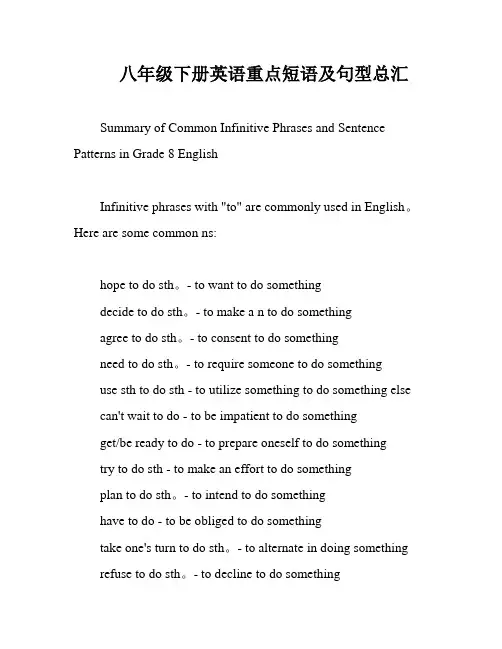
八年级下册英语重点短语及句型总汇Summary of Common Infinitive Phrases and Sentence Patterns in Grade 8 EnglishInfinitive phrases with "to" are commonly used in English。
Here are some common ns:hope to do sth。
- to want to do somethingdecide to do sth。
- to make a n to do somethingagree to do sth。
- to consent to do somethingneed to do sth。
- to require someone to do somethinguse sth to do sth - to utilize something to do something else can't wait to do - to be impatient to do somethingget/be ready to do - to prepare oneself to do somethingtry to do sth - to make an effort to do somethingplan to do sth。
- to intend to do somethinghave to do - to be obliged to do somethingtake one's turn to do sth。
- to alternate in doing something refuse to do sth。
- to decline to do somethingtell sb。
to do sth。
- to instruct XXX do somethingask sb。
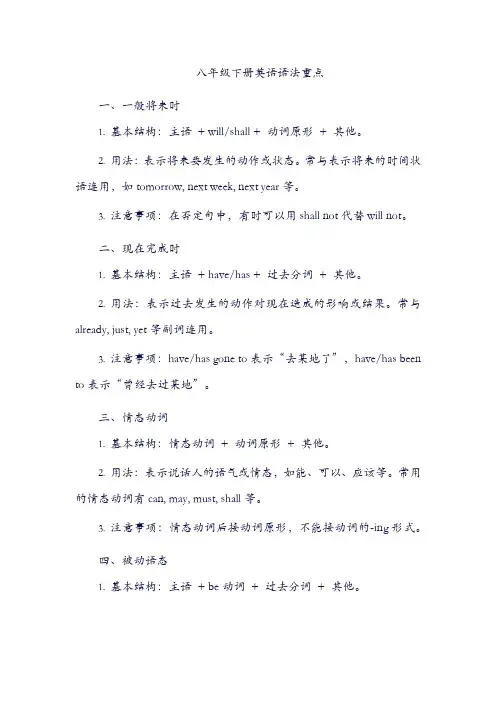
八年级下册英语语法重点一、一般将来时1.基本结构:主语+ will/shall + 动词原形+ 其他。
2.用法:表示将来要发生的动作或状态。
常与表示将来的时间状语连用,如tomorrow, next week, next year等。
3.注意事项:在否定句中,有时可以用shall not代替will not。
二、现在完成时1.基本结构:主语+ have/has + 过去分词+ 其他。
2.用法:表示过去发生的动作对现在造成的影响或结果。
常与already, just, yet等副词连用。
3.注意事项:have/has gone to表示“去某地了”,have/has been to表示“曾经去过某地”。
三、情态动词1.基本结构:情态动词+ 动词原形+ 其他。
2.用法:表示说话人的语气或情态,如能、可以、应该等。
常用的情态动词有can, may, must, shall等。
3.注意事项:情态动词后接动词原形,不能接动词的-ing形式。
四、被动语态1.基本结构:主语+ be动词+ 过去分词+ 其他。
2.用法:表示主语是动作的接受者。
常与by引导的方式状语连用,如by machine, by air等。
3.注意事项:被动语态的时态变化主要通过be动词的变化来实现,不同时态的被动语态需要注意与该时态的主动语态相对应。
五、不定代词和冠词用法1.不定代词:表示泛指或不确定的代词,如some, any, other等。
some用于肯定句,any用于否定句或疑问句;other表示“其他的”。
2.冠词:表示特指或泛指的词,分为定冠词the和不定冠词a/an。
a用于辅音音素开头的单词前,an用于元音音素开头的单词前;the 表示特指或上文提到的某个名词。
3.用法:不定代词和冠词一起使用时,可以构成限定词短语,如some books, the school gate等。
限定词短语可以修饰名词,表示特指或泛指的概念。
4.注意事项:在英语中,不定代词和冠词的使用是有规则和限制的,需要根据上下文和语境来判断使用哪个代词或冠词。
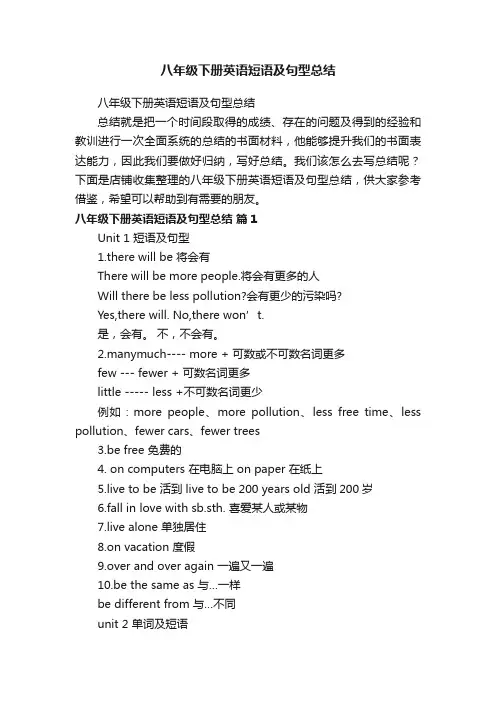
八年级下册英语短语及句型总结八年级下册英语短语及句型总结总结就是把一个时间段取得的成绩、存在的问题及得到的经验和教训进行一次全面系统的总结的书面材料,他能够提升我们的书面表达能力,因此我们要做好归纳,写好总结。
我们该怎么去写总结呢?下面是店铺收集整理的八年级下册英语短语及句型总结,供大家参考借鉴,希望可以帮助到有需要的朋友。
八年级下册英语短语及句型总结篇1Unit 1 短语及句型1.there will be 将会有There will be more people.将会有更多的人Will there be less pollution?会有更少的污染吗?Yes,there will. No,there won’t.是,会有。
不,不会有。
2.manymuch---- more + 可数或不可数名词更多few --- fewer + 可数名词更多little ----- less +不可数名词更少例如:more people、more pollution、less free time、less pollution、fewer cars、fewer trees3.be free 免费的4. on computers 在电脑上 on paper 在纸上5.live to be 活到 live to be 200 years old 活到200岁6.fall in love with sb.sth. 喜爱某人或某物7.live alone 单独居住8.on vacation 度假9.over and over again 一遍又一遍10.be the same as 与…一样be different from 与…不同unit 2 单词及短语1.What should I heshe heyyou do? 我他她他们\你该怎么办? You could write him a letter. 你可以给他写一封信。
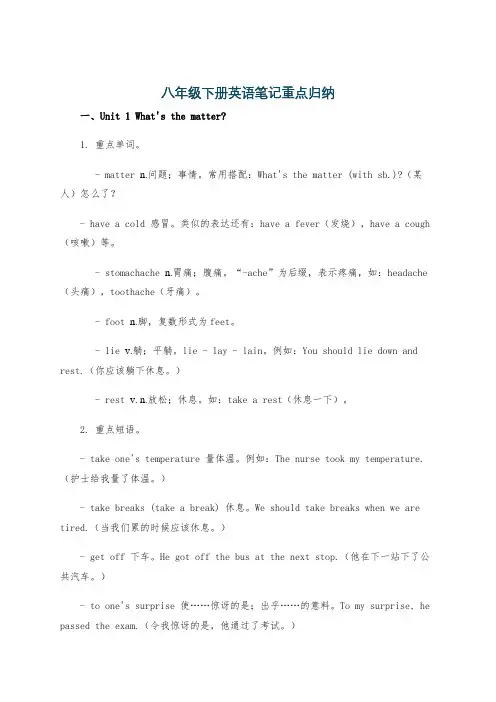
八年级下册英语笔记重点归纳一、Unit 1 What's the matter?1. 重点单词。
- matter n.问题;事情。
常用搭配:What's the matter (with sb.)?(某人)怎么了?- have a cold 感冒。
类似的表达还有:have a fever(发烧),have a cough (咳嗽)等。
- stomachache n.胃痛;腹痛。
“-ache”为后缀,表示疼痛,如:headache (头痛),toothache(牙痛)。
- foot n.脚,复数形式为feet。
- lie v.躺;平躺。
lie - lay - lain。
例如:You should lie down and rest.(你应该躺下休息。
)- rest v. n.放松;休息。
如:take a rest(休息一下)。
2. 重点短语。
- take one's temperature 量体温。
例如:The nurse took my temperature.(护士给我量了体温。
)- take breaks (take a break) 休息。
We should take breaks when we are tired.(当我们累的时候应该休息。
)- get off 下车。
He got off the bus at the next stop.(他在下一站下了公共汽车。
)- to one's surprise 使……惊讶的是;出乎……的意料。
To my surprise, he passed the exam.(令我惊讶的是,他通过了考试。
)- What should I do? 我应该做什么?用于询问建议。
- You should see a dentist and get an X - ray. 你应该去看牙医并且拍个X 光片。
should为情态动词,后接动词原形,表示建议。
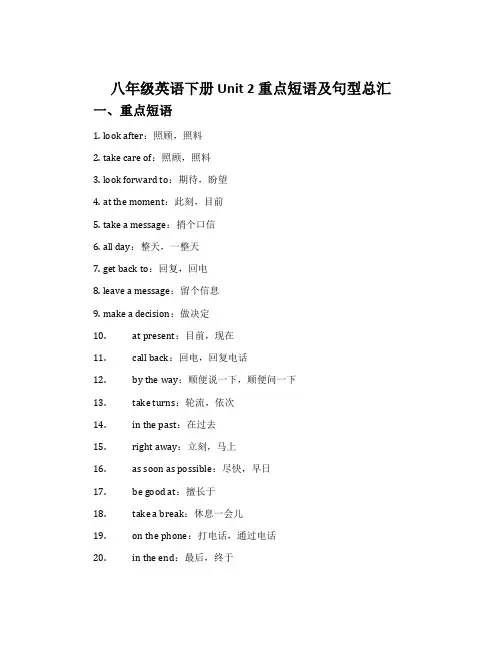
八年级英语下册 Unit 2 重点短语及句型总汇一、重点短语1.look after:照顾,照料2.take care of:照顾,照料3.look forward to:期待,盼望4.at the moment:此刻,目前5.take a message:捎个口信6.all day:整天,一整天7.get back to:回复,回电8.leave a message:留个信息9.make a decision:做决定10.at present:目前,现在11.call back:回电,回复电话12.by the way:顺便说一下,顺便问一下13.take turns:轮流,依次14.in the past:在过去15.right away:立刻,马上16.as soon as possible:尽快,早日17.be good at:擅长于18.take a break:休息一会儿19.on the phone:打电话,通过电话20.in the end:最后,终于二、重点句型1.Can you take care of my dog while I’m away?–当我不在的时候,你能照顾我的狗吗?2.I’m really looking forward to your visit next week.–我真的很期待你下周的访问。
3.Sorry, he’s not available at the moment. Can I take a message?–对不起,他现在不在。
我可以捎个口信吗?4.Please call me back as soon as possible.–请尽快给我回电。
5.By the way, have you made a decision about the school trip?–顺便问一下,你对学校的旅行做了决定吗?6.Let’s take turns to help with the cleaning.–我们轮流来帮忙打扫吧。
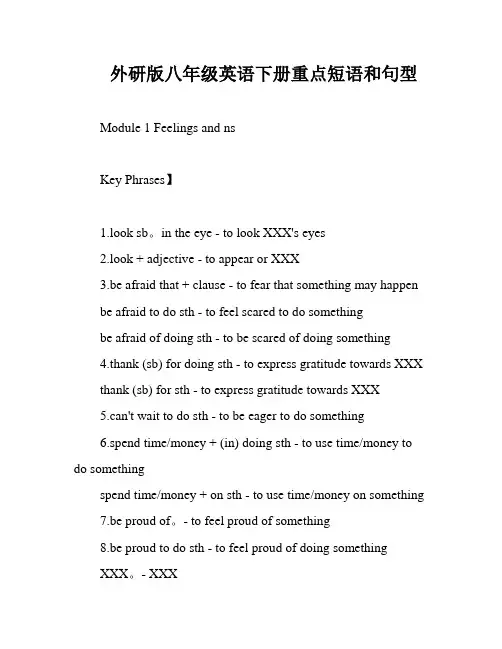
外研版八年级英语下册重点短语和句型Module 1 Feelings and nsKey Phrases】1.look sb。
in the eye - to look XXX's eyes2.look + adjective - to appear or XXX3.be afraid that + clause - to fear that something may happenbe afraid to do sth - to feel scared to do somethingbe afraid of doing sth - to be scared of doing something4.thank (sb) for doing sth - to express gratitude towards XXXthank (sb) for sth - to express gratitude towards XXX5.can't wait to do sth - to be eager to do something6.spend time/money + (in) doing sth - to use time/money to do somethingspend time/money + on sth - to use time/money on something7.be proud of。
- to feel proud of something8.be proud to do sth - to feel proud of doing somethingXXX。
- XXXXXX。
- XXX11.each other - to refer to two or more people or things that are doing something to each other12.arrive in/at - XXX13.be good at - to be XXX14.have a try - to attempt to do something15.on top - located above or in a r n16.in the middle - located in the center17.as well - also。
人教版八年级英语下册各单元知识点梳理汇总Unit 1一、重点短语1.have a fever发烧2.have a cough咳嗽3.have a toothache牙疼4.talk too much说得太多5.drink enough water喝足够的水6.have a cold受凉;感冒7.have a stomachache胃疼8.have a sore back背疼9.have a sore throat喉咙痛10.lie down and rest躺下来休息11.hot tea with honey加蜂蜜的热茶12.see a dentist看牙医13.get an X-ray拍X光片14.take one’s temperature量体温15.put some medicine on sth在……上面敷药16.feel very hot感到很热17.sound like听起来像18.all weekend整个周末19.in the same way以同样的方式20.go to a doctor看医生21.go along沿着……走22.on the side of theroad在马路边23.shout for help大声呼救24.without thinking twice没有多想25.get off下车26.have aheart problem有心脏病27.to one’s surprise使……惊讶的28.thanks to多亏了;由于29.in time及时30.save a life挽救生命31.get into trouble造成麻烦32.right away立刻;马上33.because of由于34.get out of离开35.hurt oneself受伤36.put a bandage on sth.用绷带包扎37.fall down摔倒38.feel sick感到恶心39.have a nosebleed流鼻血40.cut his knee割伤他的膝盖41.put her head back把她的头向后仰42.have problems breathing呼吸困难43.mountain climbing登山运动44.be used to doing sth.习惯做某事45.run out(of)用完;用尽46.so that以便47.so…that如此……以至于……48.be in control of掌管;管理49.in a difficult situation在逆境屮50.keep on doing sth.坚持做某事51.make a decision做出决定52.take risks冒险53.give up放弃二、重点句型1.You need to take breaks away from the computer.你需要远离电脑,休息一下。
仁爱版英语八年级下册知识点梳理Unit 5 Topic 1【重点词组】1. invite sb. to do sth. 邀请某人做某事2.one of +形容词最高级+ 名词复数3. say thanks/hello/sorry/good-bye to sb. 向某人致谢/问好/抱歉/辞别4. feel/taste/smell/look/sound/seem +adj.5. seem to do sth.seem+adj.it seems that+从句6. a ticket for/to sth.一张……的票7. lonely adj.孤独的alone adj./adv.单独的,一个人的8. because of+n./pron/v-ing 因为,由于9. cheer sb. up使某人振作起来10. care for =take care of = look after照顾11. e into being 形成,产生12. be full of = be filled with充满……13. agree with sb.同意某人14. make peace with sb.与某人和平相处16. be popular with sb.受某人欢送【词形变化】1.invite v.邀请invitation n.邀请2.disappionted adj.绝望的,沮丧的disappointment n.绝望,沮丧disappoint v.使绝望3.excite v.使冲动,使兴奋excited adj.兴奋的,冲动的(修饰人)exciting adj.令人兴奋的,使人冲动的(修饰物) 4.main adj.主要的mainly adv.主要地5.face n.脸,面部facial adj.面部的6.worry v.担忧worried adj.担忧的,担忧的【重点句型】1.--How are you doing?你好吗?--Very well.非常好。
人教版八年级英语下册重要语法知识点汇总人教版八年级英语下册重要语法知识点汇总1. 否定句型1) 一般否定句I don't know this. No news is good news.There is no person (smoke)/not a person/not any person (smoke) in the house.2)特指否定He went to his office, not to see him.I am sorry for not coming on time.I don't think/believe/suppose/feel/imagine you are right.3)部分否定All the answers are not right//All is not gold that glittersI don't know all of them.//I can't see everybody/everything.Both of them are not right.4)全体否定None of my friends smoke.//I can see nothing/nobody.Neither of them is right.//Nothing can be so simple as this.5) 延续否定You didn't see him, neither/nor did I.You don't know, I don't know either.He doesn't know English, let alone/to say nothing of/not to speak of (更不用说) French.6) 半否定句We seldom/hardly/scarcely/barely hear such fine singing.I know little English. I saw few people.7) 双重否定You can't make something out of nothing.//What's done cannot be undone. There is no sweet without sweat.//No gain without pains.I can't help /keep/ laughing whenever I hear it.No man is so old but (that) he can learn.8)排除否定Everyone is ready except you.//He did nothing but play.But for your help, I couldn't do it.9)加强否定I won't do it at all.//I can't see it any more.//He is no longer a boy.2. 判断句型1) 一般判断句It is important for us to learn English.It is kind of you to help me sincere means honest.The boy is called/named Tom.We regarded/consider it as an honor.2)强调判断It is English that we should learn.//It is he who helped me a lot.3)弱式判断Your sentence doesn't sound/look/appear/feel right.You look/seem as if/as thought you had been there before.Maybe/Perhaps/ she is ill.He is probably ill.//He is likely ill. //It is possible that he is late 4) 注释判断He can remember so many English words, that is (to say) he is a living dictionary.(活字典)5) 正反判断That sounds all right, but in fact it is not.6) 比较判断It is more a picture than a poem.7) 互斥判断He or you are wrong. Either he is right or I am.3. 祝愿祁使句式1) 一般句式Study hard and keep fit. Be brave! Don't be shy! Get out of here.2)强语式Do tell me. Never tell a lie.3) 委婉祈使句Please tell me the true. Would/Will/Won't do me a favor?Would/Do you mind my smoking? What/How/ about going on foot?4)建议祈使句Let us go. Let us know the time. Don't let the fire out.Let's not waste the time. You'd better start early.Shall we listen to some music? Why don't you get something to drink? Suppose/supposing you pick me up at about six?I suggest we (should) take the train.5)祝愿句Success to you! //Wish you a good journey.May you have a happy marriage. //Here's to your success!Allow me to propose a toast to our friendship!4. 感叹句型How well he speaks! //How kind she is! //What a nice weather it is! Here he comes! //Such is life! //Wonderful! // Help!5. 疑问句型1) 一般疑问句Is he a doctor?//Do you the way to the station?2)反意疑问句He is a teacher, isn't he?//It is quite cheap, don't you think?3) 特殊疑问句What is the distance/width/size/population/temperature/fare?Who is he? What is he?(干什么的)//What is he like? // How is he? How do you like him? //What do you think of him?What ever do you mean by saying this?4)选择疑问句He is a doctor or a nurse?5)间接疑问句Do you know how old he is? //Tell me if (whether) you like it.What do you think/say/suppose I should do?6. 数词句型1) 表数目It is exactly ten o'clock.//It is five miles away from here.He is more than/over/ at least not less than 20.He is under/at most/no more than 20.2)表年月日He was born on April 22 1994/in 1994 on the morning of Oct.1.3)表年龄He is 20 years old/years of age.//He is at the age of 10.4)表倍数It is four times that of last years.This is four times as big (again) as that one.This is four times bigger than that one.The income is double what it was.The output of coal was 200% greater than in 1998.5)表计量It is 10 meters long/wide/high.//It costs me 100 yuan.I spent 10 hours to finish it.//It took me 10 days to finish it.It is worth 100 yuan.7. 关联指代句型1)两项关连I have two books, one is Chinese; the other English.I have five books, one is Chinese; the others English.To say is one thing, but/and/ to do is another.One the one hand, I am your teacher, and on the other hand, I am also you friend.Some like to play football, others are fond of basketball.2)先后顺序First/firstly, I wish good health, second/secondly success in your study, third/thirdly good luck in everything.First stop, then look, finally cross.At first/in the beginning/ he word hard. Later/Afterwards he is not so diligent.3)修饰限制This is the same book as I lost yesterday.This is the same book that I lost yesterday.(同一本书)Don't trust such a man as over praise you.He/One/Those/They who should come failed to appear.A man/A person/The one/Anyone/People who saw her liked her very much.The day/time/moment will come when China is strongest in the world.4) 两项连接He can speak not only English but also French.The book is both interesting and instructive.It is neither cold nor hot.Please either come in or go out.The old worker has experience and knowledge as well.5)加和关系Besides literature, we have grammar and writing.Apart from oxygen, there are some other gases in the air.In addition to "if", there is many other conjunctions that can introduce conditional clauses.I must go now, incidentally, if you want that book.You seem to like tea, so do I.8. 比较句型1)等比句He is as tall as I. // He is the same height as I.She is no less diligent than he. The lab is no better than a cottage.2) 差比句I speak English worse than he does.//He is not so/as tall as I am.Our knowledge is much inferior to their.3) 极比句He is the tallest of all in the class.None/No one/ is so blind as those that won't see.Nothing is so easy as this.4)比例句The more a man knows, the more he feels his ignorance(无知).5) 择比句He is taller than any other boy in the classIt is better late than never.//They would die than live as slavesHe prefers doing to talking//He prefers to do rather than to talk.He prefers mathematics to English.//I'd rather stay here.6)对比句You think me idle, but on the contrary, I am busy.They are working hard while you are wasting your time.9. 比喻句型We must work like him.//He behaves as his father does.He speaks English as if/though he was a foreigner.10. 条件假设句1) 一般事实If we succeed, what will the people say?Suppose it rains, what shall we do?Persevere(坚持) and you'll succeed.2)虚拟条件句If I were you, I would go.//If you had seen it, you would have been moved.3)反条件句Unless you try, you'll never succeed.//Don't move, or/else/otherwise I'll shot.4)唯一条件句If only I have another chance, I shall do better.Only in this way can we learn English well.So/As long as we don't lose heart, we'll succeed.5)推论条件句Since that is so, there is no more to say.Now that you are grown up, you must stop this behavior.11. 时间句型1)一般时When I see him, I'll tell him.2) 表同时You'll grow wiser as you grow older.Work while you work, play while you play.He worked, at the same/in the meantime he listened to the music.3)限制时Every/each time when I went to his house, he was out.By the time that we got there, he was out.4)交替时Sometimes he sings, sometimes he dances.At one time the baby cries, at another it talks.5)先时I stopped hem before he began to talk with me.6)后时I'll tell you after I finish it.7)紧接时As soon as I see him, I'll tell him.Once you begin, you must continue.The (very) moment/instant (that) I saw him, I recognized him. On hearing the news, she bust into tears.Hardly had I seen the light, when I heard a loud thundering.8)延续时I haven't seen him since I came here.A friend is never know till/until a man have need.12. 地点句型1) 一般地点Where have you been?Where there is a will, there is a way.2)方位Hebei lies in the east of China.Japan is lies to the east of China.The house faces (to) the south.He is sitting at the front of the classroomHe is standing in front of/before me.He is sitting at the back of/behind me.He is sitting in the back of/at the rear of the classroom. He is sitting next to/besides me.He is sitting close to/near me.At the top of/On top of the shelf, there are some books.He is sitting on the left/right.The mountain you see to the right is the Purple Mountain. 13. 原因句型He didn't go to school because he was ill.Since we are all here, let's begin our meeting.It might rain yesterday, for the ground was wet.Now (that) we have finished the work, we can go home.I am glad to meet you.I am sorry that I hear that.Thank you for your help.That is why he failed to come.He didn't come because of/on account of the weather.He went out of curiosity.I succeeded thanks to his help.This failure is due to the fact they lack experience.Owing to our joint efforts, the task was fulfilled.What are studying English for?For what reason did you choose this?What's the point of asking his to do that?How come you never told me about it?What with the wind and what with the rain, our walk was spoiled.14. 目的句型He stopped aside so that she could go in.He sits in the front in order that he can see words clearly.He gets up early so as to/in order to have time to do exercises. He repeated it for fear that there should be any mistake.15. 结果句型It was very cold, so that the river froze.They cost a lot of money, so/therefore we use them carefully. He is such a good man that every one likes him.He ran so fast that no one could catch him.He hurried to the house only to find that it was empty.I was caught in the rain. As a result, I had a bad cold.16. 程度句型How often do you write to your parents?How long do you stay at home?It is so beautiful that we all love it.It is too big for you.He is too excited to speak.He is not old enough to know this.The letter must be sent as soon as possibleYou must work as hard as you can.As far as I know, I can speak only English.17. 让步句型Though/Although he is rich, (yet/still) he doesn't show off.Yang as he is, he know a lot of things.Even if/though he succeeded, he was not proud.No matter what you say, I'll still try to do it.Keep calm, whatever happens.In spite of this, we must go ahead with our plans.Regardless of all the difficulties, we'll fight it out to the end.18. 转折句型I searched everywhere but could not find him.You may go, only return quickly.He is seriously ill, still there is hope of his recovery.It looked like rain, however it was clear in the afternoon.He is still young, yet he is high up in the position.He didn't tell me the truth, I know it, though.19. 省略句I think/say/suppose/expect/believe/hope so.Why not come earlier next time?。
八年级下册英语人教版3单元重点句型一、关于做家务的句型。
1. Could you please clean your room?这就像是在说:“你能不能把你的房间打扫一下呀?”就像你老妈早上催你打扫你那像猪窝一样的房间时说的话。
这是一个很礼貌地请求别人做某事的句型,“could”比“can”更委婉哦。
2. Could I use your computer?想象一下,你想去玩小伙伴的电脑,你就得很客气地说:“我能不能用一下你的电脑呀?”这个句型在你想向别人借东西或者请求许可的时候超好用的。
3. -Could you take out the rubbish? -Sure. / Sorry, I can't. I have to do my homework first.一方说:“你能把垃圾倒一下不?”另一方要么说“当然可以”,就像个热心肠的小天使;要么就说“对不起,我不能,我得先做作业呢”,就像个被作业压得喘不过气来还得拒绝别人请求的可怜娃。
4. You need to clean the living room.这就好比是家里的老大给你下命令:“你得把客厅打扫干净。
”很直接地告诉别人需要做什么。
5. I hate to do chores. It's so boring.就像很多人心里想的那样:“我讨厌做家务,太无聊了。
”当你不想干活的时候,就可以这么抱怨。
6. Thanks for taking care of my dog.如果有人帮你照顾你的狗狗,你就得感激地说:“谢谢你照顾我的狗。
”这是很基本的礼貌表达。
二、关于提供帮助或请求帮助的句型。
1. Could you help me with my English?你要是英语学得不好,想找个学霸帮忙,就可以这么说:“你能帮我学英语吗?”很简单直白的请求帮助的句子。
2. I'll help you fold the clothes if you like.这就像是在说:“要是你愿意的话,我来帮你叠衣服。
人教版八年级下册各单元英语语法解析知识重点总结新目标英语八年级(下)重点短语及句型总Unit 1 Will people have robots?1. fewer people 更少的人(fewer 修饰名词复数,表示否定)2. less free time 更少的空闲时间(less 修饰不可数名词,表示否定)3. in ten years 10年后(in 的时间短语用于将来时,提问用How soon)4. fall in love with … 爱上……例:When I met Mr. Xu for the first time, I fell inlove with him at once.当我第一次见到许老师,我立刻爱上他。
5. live alone 单独居住6. feel lonely 感到孤独(比较:live alone/ go alone 等)The girl walked alone along the street, but shedidn't feel lonely.那女孩独自沿着街道走,但她并不感到孤独。
7. keep/ feed a pet pig 养一头宠物猪8. fly to the moon 飞上月球9. hundreds of + 复数数百/几百(概数,类似还有thousands of;millions of)10. the same as 和……相同11. A be different from B A与B不同(= There is a difference/ Thgere aredifferences between A and B)12. wake up 醒来(wake sb. up 表示“唤醒某人”)13. get bored 变得厌倦(get/ become 是连系动词,后跟形容词如tired/angry/ excited 等)14. go skating 去滑冰(类似还有go hiking/ fishing /skating/ bike riding 等)15. lots of/ a lot of 许多(修饰可数名词、不可数名词都可以)16. at the weekends 在周末17. study at home on computers 在家通过电脑学习18. agree with sb. 同意某人(的意见)19. I don't agree. = I disagree. 我不同意。
八年级下册英语语法汇总八年级下册英语语法汇总一. 询问某人的健康问题及遭到麻烦的表达方法1. 询问某人患了何种疾病或遇到了何种麻烦时,常用以下几种结构来表达:What’s the matter (with sb.)?(某人)怎么了?What’s wrong (with sb.)?(某人)怎么了?What’s the trouble with sb? 某人出什么事了?What happened to sb? 某人发生了什么事?Are you OK? 你没事吧?Is there anything wrong with sb.?某人有不舒服/麻烦吗?2. 要表达身体疼痛或不舒服,可用以下结构:①某人+have/has+病症The twins have colds.双胞胎感冒了。
②某人+have/has+a+headache/toothache/stomachache/backache/earache. She had a stomachache last night. 她昨晚肚子痛。
③某人+have/has+a+sore+发病部位He has a sore throat. 他喉咙痛。
④某人+hurt(s)+身体部位或反身代词He hurt his leg. 他的腿受伤了。
⑤某部位+hurt(s).My head hurts badly. 我头痛得厉害。
⑥某人+have/has+a pain+in one’s+身体部位I have a pain in my chest. 我胸口痛。
⑦(There is) something wrong with one’s+身体部位There is something wrong with my right eye. 我的右眼有毛病。
⑧其他表达方式She has a heart trouble. 她有心脏病。
He got hit on the head. 他头部受到了撞击。
Unit1重点句型:1、I think every home (将有一个机器人).2、Kids (将不去学校). They’ll study at home on computer.3、-Will people use money (一百年后)?4、There will be (污染会减少). There will be more people.5、-Cities will be very (大而且拥挤).6、- (将会有)fewer trees?-Yes, there will. / No, there won’t.8、I think (将会出现更多的高楼). And there will be fewer cars and buses.9、I’ll be an astronaut. I’ll (乘火箭飞到月球)10、I went to Shanghai last year and___________________________(爱上) it.11、During the week,I __________________________________(将能穿着更随意)。
12、I think I’ll (和我最好的朋友住在公寓里),because I don’t like living alone.13、I think that (下一届世界杯法国会获得冠军). 14、-What (天气怎样)tomorrow?-It’ll be sunny.15、-What will teenagers do for fun (从现在起二十年)?-They will travel into space for fun, I guess..16、I (想自食其力)when I’m older.17、One day people (会飞到月球上度假).18、He thought that computers would never (被大多数人用).19、(未来的人们)have their own robots and the robots help people_________________________________(做最令人不愉快的工作)20、(一些科学家相信)that there will be such robots in the future,but it may____________________________(花很多年时间)。
21、(日本公司)have already made robots walk and dance.22、For example, there are already robots (在工厂干活).23 In the future there will be more robots everywhere and ___________________________ _____________(人类会有更少的工作做).24 After an earthquake, a snake robot could help (寻找建筑物下的幸存者Unit 2重点句型:1、My parents want me (每天晚上都呆在家里).2、-What’s wrong?-My clothes are (过时了).3、-My brother (放唱片声音太大).-You should ask him to turn them down..4、-I (吵架) my best friend.-You could write him a letter.5、-You should (给他一张球赛的票).-It’s not easy.6、-What’s the matter?-I can’t (解决这个数学题).7、-What should he do?-Maybe he should ( 向老师求助).8、-I need to get some money (支付夏令营的费用).–You could get a part-time job.9、-She is very shy. –She could (加入一个俱乐部或者交更多的朋友).10、They are original. They are (和我朋友的衣服一样).11、(我们班其它人都被邀请了)except me. I’m veryupset and don’t know ______________(怎么办)。
12、You should (对别人更友好一些).13、You should (和你的父母讲讲你的烦恼).14、My cousin is__________________(和我一样大) and we________________(相处很好)。
15、The tired children (直到下午7点才回家).16、Many parents are always_______________________other children (把自己的孩子与别人作比较).17、These children may____________________________(发现很难独立思考)。
.18、Parents are trying (规划他们孩子的生活).19、The children need_______________________________(时间和自由来放松)。
Unit 3重点句型:1、(你正在做什么)when the UFO arrived?2、(外星人正在买纪念品时),the girl called the police.3、(那个女孩正在购物)when the alien go out.4、I (有一个很不寻常的经历)on Sunday.5、(车站很拥挤)and Linda couldn’t see Dave anywhere.6、She didn’t think about (往车站外边看).7、There was a police officer (他们旁边).8、He was (正在遛狗).9、My flight to New Y ork was (正从北京国际机场起飞).10、Although some people may not remember (谁谋杀了他), they remembered what they were doing when they heard about the event.11、It was a bright, sunny day. We were (正在操场上玩得开心).12、Not all events in history are (和这一样可怕), of course. The murder_______________(发生) thirty years ago.13. This is_____________________________(最重要的事件之一) in Chinese history.Unit 4重点句型:1. You ___________________ (应该,suppose) meet at the bus stop this morning to return it.2. I’m________(努力)and_________(幸运),and I hope you ’re___________(健康)。
3. I said I didn’t think it was a good idea for her____________________(抄我的家庭作业)because it would ___________________(养成一个坏习惯).I was sure she would _________(克服它).4.In English,I __________________(更擅长阅读) than listening.5. Every year they send 100 volunteers ________________________(在中国的边远地区支教)6. There is________________________(没有区别) between you and them..7. They said that we’re ____________________________(象大哥哥姐姐们一样) them and they ___________________(感到幸运)。
8. Some students mat not be ______________________________(能上高中或大学).9. She said she would _______________(回到)the area after ____________________(毕业后).Unit 5重点句型:1.If you go to the party, you_______________________(会玩得高兴)2.What___________ (会发生)if they have the party tomorrow? If we do, half the class___________(不会来)3.For many young people, becoming a professional athlete might________________ (似乎是梦想的工作)4.The teacher _______________(拿走了我手机)because I_______________(上课用了它).5 I forgot your address. I can’t remember______________________(怎样到达你家)。
6. If you become a player, you will be able to__________________(做你喜欢的事情来谋生)。
7.If you become rich,you will__________________(很费力) knowing who your real friends8 The students are skating_______________________________(为慈善机构筹钱)。
Unit 6重点句型:1.How long have you ________________(收集贝壳)? ____________________(自我十岁以来)2.Alison was _________________(第一个开始)and has been skating for the whole five hours3.Mom says I have to stop, because we ‘ve _________________________(没有地方存放它们)4. My hobby is________________________( 收集古币).5.I ________________________________(没写完答卷) because I ran out of time.6.There _____________________(有一些欧洲影响)in the city, and some of the old buildings in Harbin ________________________(具有俄国风格).Unit7重点句型:27Would you mind____________________________(关小音乐)? Sorry,I will do it______________(立刻,马上)。